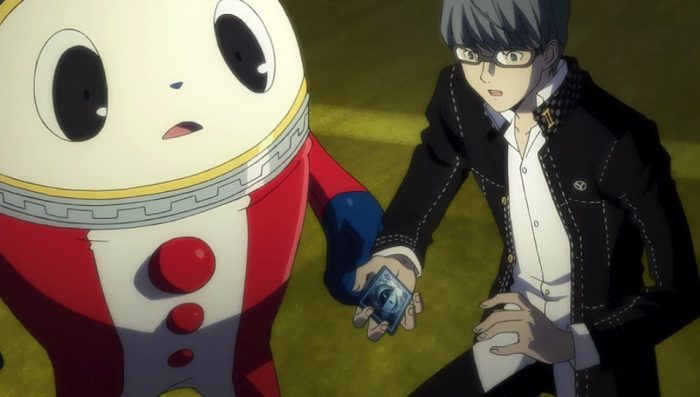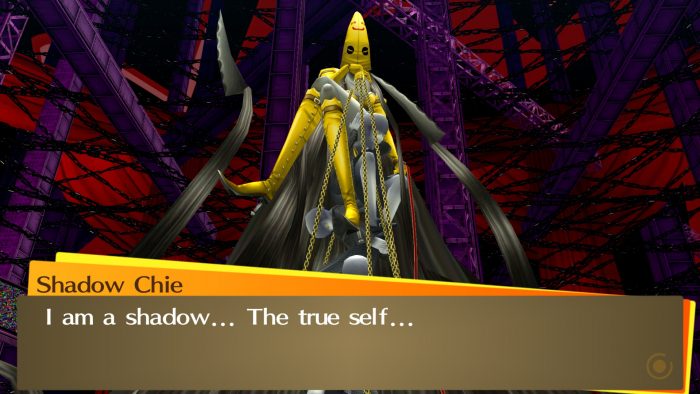WARNING – Spoilers for Persona 4 follow.
Most Persona games can be summarized as follows: a Japanese town experiences a supernatural event, which escalates into a world-ending threat, and the planet’s only hope is an unlikely group of teenagers. In Persona 4, the Japanese town is the sleepy, rural Inaba and the supernatural event is the murder of two townspeople, with the murders connected to the mysterious Midnight Channel. Investigating these happenings and preventing more murders falls to a group of local teenagers called the Investigation Team. Over the course of Persona 4, players get to know the Investigation Team intimately, to the point where they seem like real people. Except, you know, with demon-summoning powers.
In Persona 4, the heroes battle their inner demons by literally battling demons. The Midnight Channel is a frightening alternate dimension accessible via television in Inaba and populated by apparitions called Shadows. Unsuspecting humans trapped in the Midnight Channel are imprisoned in themed dungeons and confronted by Shadows resembling them. These personalized Shadows embody the parts of themselves they hate the most — the same concept of “shadow” introduced by psychologist Carl Jung. Every Persona 4 main character (other than the protagonist) meets their Shadow and initially rejects it, which only makes the Shadow stronger. After the team defeats the Shadow in a boss battle, the future party member accepts that the unpleasant Shadow is a real part of them, gains Persona powers, and officially joins the Investigation Team.
Over the course of Persona 4, players get to know the Investigation Team intimately, to the point where they seem like real people.
This repeating arc in Persona 4 — introducing the character, rejecting their Shadow, accepting their Shadow, and joining the Investigation Team — is key to understanding each character. During character introductions, the player sees only their outermost shells: for example, Kanji is a rude, violent delinquent by the account of everyone other than his mother. Journeying through each character’s dungeon and meeting their Shadows displays their innermost fears and anxieties: Kanji’s dungeon is a steamy bathhouse and his Shadow is a flamboyant gay stereotype, because deep down Kanji questions his own sexuality. After Kanji joins the team, spending time with him during story moments and optional Social Links reveals that Kanji probably isn’t gay (he’s attracted to Naoto, after all), loves sewing and crafts, and is still haunted by the death of his father, whose dying words implored Kanji to be a strong man. Kanji’s masculine front overcompensates for his conflicted feelings, which stem from female classmates ridiculing him for liking cute or “feminine” things. Kanji is much more than a mere delinquent.
And Kanji is just one example out of seven. Yosuke hates living in Inaba and resents that many townspeople blame him and his family for the decline of the local shopping district; Yukiko is unsure what she wants to do after high school and feels burdened by expectations to run her family’s inn someday; Chie questions her own femininity and acts as Yukiko’s protector to feel satisfaction because Yukiko “needs” her; Rise quits being an idol because she hates being famous; Naoto questions her own gender identity because the real and fictional detectives she idolizes are overwhelmingly male; Teddie (a blue bear with curious transforming powers) isn’t certain what sort of being he actually is.

These aren’t normal struggles for video game characters. Sexuality, gender identity, and existential crises are topics that Japanese RPGs overwhelmingly shy away from, and Persona 4‘s cast addresses them in mostly sensitive ways. I personally wish that Persona 4’s writers took bolder directions with Kanji and Naoto, who fall into heteronormative boxes by game’s end, but the fact that these issues are ever addressed is impressive. And Persona 4‘s cast isn’t uniformly likable, either! Yosuke’s friendship with the protagonist is moving, but he’s also a homophobic dweeb. Teddie is an irritating, somewhat perverted mascot character. Rise may have jumpstarted the trend of so many pop idol girls appearing in Japanese RPGs, which is a trend I’d like to see curbed.
Persona 4‘s Social Links — optional dialog scenes that strengthen the protagonist’s powers — help the player grow closer to the core cast, but also allow him to interact with a wealth of entertaining NPCs. The protagonist’s uncle, Dojima, is a lovable gruff detective, and Dojima’s daughter Nanako is a precious, precocious elementary schooler even more lovable than her father. The classmates that the protagonist meets in Inaba don’t have as much screentime as the members of the Investigation Team, but are an interesting group nonetheless. Consoling the brother of one of the murder victims and convincing a selfish upperclassman not to commit suicide are scenes in two of the more memorable Social Links.

The villains in Persona 4 aren’t as interesting as the Investigation Team, but defeating them on behalf of the team is largely satisfying and adds to the story. The copycat killer Mitsuo is a delusional creep; the red herring Namatame commits the grave sin of kidnapping the adorable Nanako; and the goddess Izanami is a heartless manipulator who may end the world if you don’t fight to her satisfaction. P4‘s main antagonist, Adachi, is both the answer to the game’s whodunit question and the game’s most memorable villain. Seeing Adachi transform from Dojima’s bumbling partner into a twisted killer is unnerving and impressive.
The story structure for much of the game revolves around finding new teammates, breaking down their facades, and discovering their motivations and layers of their personalities with each boss fight, plot point, and Social Link. The events of Persona 4‘s plot and the growth of its main cast are intertwined. The Investigation Team is sometimes unfavorably compared to Mystery Incorporated of Scooby-Doo fame, implying that Persona 4‘s tone is too lighthearted and cast is too frivolous. Now, being compared to Scooby-Doo should be a badge of honor (Buffy the Vampire Slayer fans know where I’m coming from), but that aside, I love the cast of Persona 4. These seven teenagers and one bear are imperfect, vulnerable, and totally lovable. I’ll never forget the time I spent with them in Inaba.



